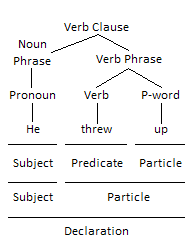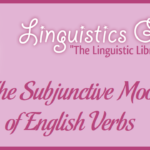Particles are function words that express grammatical relationships with other words. Function words are words that perform definite grammatical functions but that lack definite lexical meaning. Only one grammatical form can perform the grammatical function of particle in the English language: p-words. Similar in form to prepositions, p-words function as particles within three constructions in English:
- Phrasal verbs
- Quasi-modal verbs
- Determiner phrases
The following sections explain and exemplify the particle in English grammar.
Particles in Phrasal Verbs
The first grammatical construction in the English language that contains a p-word that functions as a particle is the phrasal verb. Phrasal verbs consist of a verb followed by one or more p-words. The p-word of a phrasal verb functions as a particle. Examples of phrasal verbs include the following:
- call off (cancel)
- lay in on (criticize)
- let up (diminish, lessen)
- pass on (transmit)
- rule out (eliminate)
- throw up (vomit)
The following grammar tree illustrates the form and function of the phrasal verb including the function of the p-word as a particle:
Particles in Quasi-modal Verbs
The second grammatical construction in the English language that contains a p-word that functions as a particle is the quasi-modal verb. The modal verb — a term that encompasses both full modal verbs and quasi-modal verbs — is a distinct auxiliary verb form of the English language that differs from prototypical verbs in grammatical form and grammatical function. Three English quasi-modal verbs contain p-words that function as particles:
- ought (to)
- had better (had best)
- used to
The p-words of the quasi-modal verbs are to and better (best). The following grammar tree illustrates the form and function of the quasi-modal verb including the function of the p-word as a particle:
Particles in Determiner Phrases
The third grammatical construction in the English language that contains a p-word that functions as a particle is the determiner phrase. In English grammar, more than one determiner in the form of a determiner phrase can function as the determinative of a single word or phrase. The following italicized determiners are examples of determiner phrases:
- All three of the children refused to eat any of their vegetables.
- The thirteen books were each popular titles.
- All her many accomplishments impressed the many members of both of the search committees.
In determiner phrases such as all three of the, any of their, and both of the in the previous sentences, the p-word of functions as a particle. The following grammar tree illustrates the form and function of the determiner phrase including the function of the p-word as a particle:
P-words perform the grammatical function of particle — which are function words that express grammatical relationships with other words but that lack definite lexical meaning — within phrasal verbs, quasi-modal verbs, and determiner phrases in the English language.
Summary
Particles in English grammar are function words that express grammatical relationships with other words. Function words perform definite grammatical functions but lack definite lexical meaning.
Particle is a grammatical function.
The grammatical form that can function as the particle in English grammar is the p-word.
The p-words of phrasal verbs, quasi-modal verbs, and some determiners function as particles.
References
Brinton, Laurel J. & Donna M. Brinton. 2010. The linguistic structure of Modern English, 2nd edn. Amsterdam: John Benjamins Publishing Company.
Hopper, Paul J. 1999. A short course in grammar. New York: W. W. Norton & Company.
Huddleston, Rodney. 1984. Introduction to the grammar of English. Cambridge: Cambridge University Press.






